Update: Markus Hoffmann uploaded a new version of X11Basic-1.20.tar.gz to SourceForge that addresses most of these problems. I’ve edited the article to remove the obsolete bits.
More than 20 years ago, I really liked GFA-Basic. It ran blindingly fast on the Atari ST, and when it didn’t crash on the Amiga, it ran blindingly fast there too. I even wrote a review of it for comp.sys.amiga.programmer, which you can read to this day in all its textual glory. One of the e-mail addresses in that article still works, too.
I still sometimes think in BASIC, and there is much wringing of hands (not by me, really) that there isn’t a good interpreter for Raspbian on the Raspberry Pi. So when I found X11-Basic — a cross-platform GFA-Basic-like system — I had to take a look.
While I have managed to get X11-Basic demos to run, I have to say it’s not running super well. I’ll show you how to install X11-Basic 1.20 and get it (mostly) running, but it’s a bit rough on the ARM. Incidentally, these instructions also work on Ubuntu 12.mumble LTS on x86.
First, you need to install some (okay, a lot of) packages:
sudo apt-get install libreadline-dev tcsh libncurses5-dev xutils-dev libc6-dev libsdl1.2-dev libtool
Now download and extract the package:
tar xvzf X11Basic-1.20.tar.gz cd X11Basic-1.20
For X11Basic-1.20, you have to issue an extra command before the standard ‘./configure ; make ; make install‘ sequence:
sudo mkdir -p /usr/local/share/man/man1 ./configure make sudo make install
This is enough to make a working xbasic interpreter. I made some screenshots of some of the graphics demos —
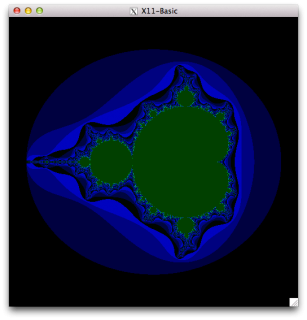
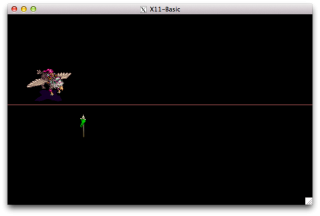
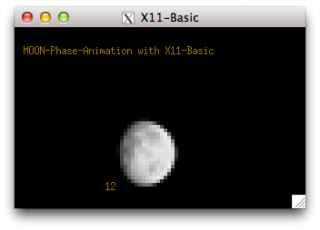
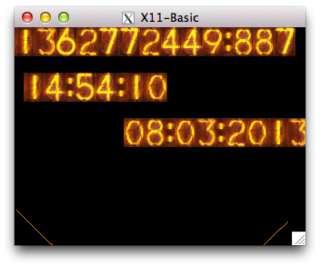
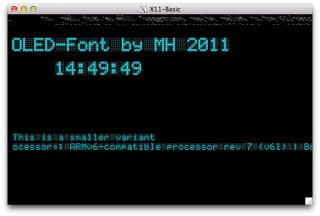 As you can see, there’s some screen corruption, but most demos just worked. Incidentally, the Mandelbrot one took almost 1¼ hours to run. Took me right back, that did (or it would have, if I hadn’t been outside bombing about in the slush on my bicycle while it churned away).
As you can see, there’s some screen corruption, but most demos just worked. Incidentally, the Mandelbrot one took almost 1¼ hours to run. Took me right back, that did (or it would have, if I hadn’t been outside bombing about in the slush on my bicycle while it churned away).
In order to see just how fast the interpreter is, I ran the formerly fearsome Personal Computer World Benchmark #8 under X11-Basic. PCW#8 used to bring 8-bit home computers to their knees, typically taking more than a minute to run. Here’s the code, indented a bit and with a timing wrapper added:
LET start=TIMER LET K=0 L30: LET K=K+1 LET A=K^2 LET B=LN(K) LET C=SIN(K) IF K<1000 GOTO L30 ENDIF PRINT TIMER-start QUIT
(yeah, GFA-style BASIC isn’t too pretty …)
It takes about ¼s to run. The old BBC B was supposed to take about 50s. By comparison, X11-Basic on a manky old dual-core Atom took 0.04s.
The native compiler xbc seems to work. To make a standalone binary of the above code, you do:
xbc -o PCWBenchmark PCWBenchmark.xbas
The compiled binary runs roughly twice as fast as the interpreted code. Not blazing fast, but a useful increase.
Unfortunately, the bytecode compiler xbbc doesn’t actually do anything on the Raspberry Pi yet. So here I leave it up to you to play with X11-Basic, and see what it can and can’t do.
Nice. Now you just need to find a way to play that annoying Plink sound every time you press a key for that truly authentic Atari ST feeling 😉
I’ll get right on that …
You do not need the libsdl-dev stuff. Better install libx11-dev instead. This way remote graphics is faster. Unfortunately no direct gpio commands. Just via shell access. Usb support also is not working.